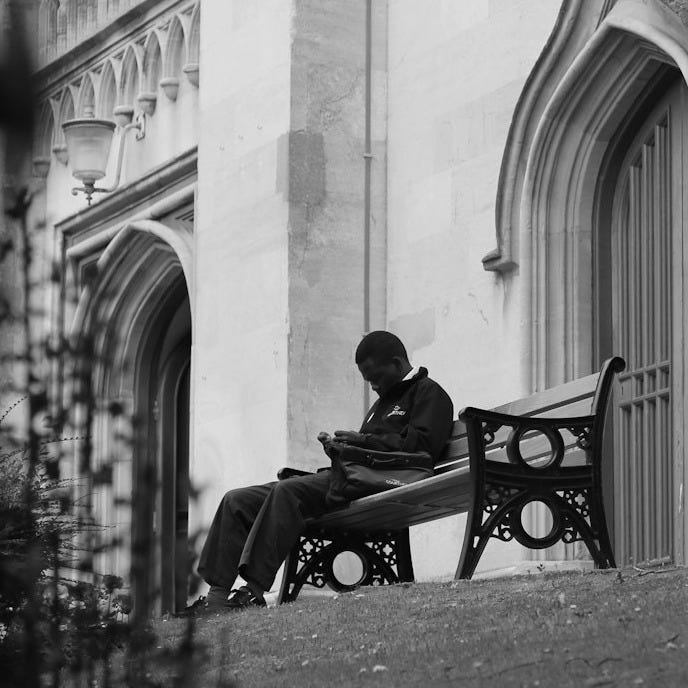The Peril of Independent Christianity Part 2
Reflection on John 4:1-6

Beloved, do not believe every spirit, but test the spirits to see whether they are from God, for many false prophets have gone out into the world. (1 John 4:1)
In today’s world, voices are more plentiful and accessible than ever before. The impulse for self-expression has always been part of the human experience, but now there are almost limitless platforms to amplify those voices. Communication channels are no longer confined to traditional media or controlled spaces; they are abundant, instant, and far-reaching. As a result, the marketplace of ideas is flooded with a cacophony of competing voices. In all this noise, the richness of meaningful discourse—whether personal or communal—often gets lost.
On one hand, anyone can now broadcast their thoughts to the world. On the other, the gatekeeping role of traditional media has all but disappeared. Personal social media channels have no editorial oversight, no vetting process, no built-in accountability. The result? A flood of voices—unfiltered, unchecked, and often unmoored from Biblical truth.
The Babbler, too, is part of this mix—one more voice in a sea of independent writers vying for attention. I feel the weight of that reality. Words have power—to build up or tear down, to bring truth or to sow division. That power demands reverence. As a writer still finding my public voice, it’s why I embrace this calling with a deep sense of responsibility: to use this platform carefully, to speak with integrity, and to resist the temptation to wield words in ways that harm rather than heal.
John’s warning to the early church feels startlingly contemporary in this context: “Do not believe every spirit, but test the spirits.” Not every voice is speaking from the Spirit of God. Some flow from the Spirit of truth; others are rooted in error. And the difference between the two isn’t always obvious.
This is why discernment isn’t optional for followers of Christ. It’s essential.
John explains in verse 5,
They are from the world; therefore they speak from the world, and the world listens to them.
This describes so much of what fills our feeds and playlists today. The world amplifies voices that affirm its values, its priorities, its self-made truths. Those who speak from the world find an eager audience because they reinforce what the world wants to hear. But “we are from God (v. 6).” Our ears must be tuned differently.
How do we tune them? How do we recognize the Spirit of truth from the spirit of error?
First and foremost, we anchor ourselves in the Word of God.
The Bible is our authentic source. It is the standard by which every teaching, every opinion, every insight must be measured. Scripture has been scrutinized, canonized, and faithfully passed down through generations as the inspired Word of God.
Your word is a lamp to my feet and a light to my path. (Psalm 119:105)
We can trust it. But God has also given us His Church as a safeguard.
Paul calls it “the pillar and buttress of the truth” (1 Timothy 3:15). The early believers understood this. “And they devoted themselves to the apostles’ teaching and the fellowship, to the breaking of bread and the prayers.” (Acts 2:42)
They didn’t live as spiritual free agents but as a people under the care of godly shepherds and in fellowship with one another.
In a world where trustworthy gatekeepers of truth are often sidestepped, the Word of God and the Church remain God’s appointed means of keeping His people anchored. This is why it’s vital to be in a faithful church, under spiritual authority, regularly sitting under the preaching of God’s Word. Lone Christians are vulnerable Christians. Left to ourselves, we’re far more likely to be swayed by voices that “sound right” but are rooted in error.
As I reflect on this, I’m reminded of my own responsibility as the writer of The Babbler.
It would be easy—even unintentionally—to slip into spiritual error. To let the focus drift from God’s Word to my own observations about all that is broken, objectionable, or wrong in the world. Even Scripture itself can be wielded poorly if we’re not careful, used not to reveal God’s truth but to prop up opinions.
My goal is for The Babbler to remain firmly rooted in the Bible—not driven by topical commentary or cultural critique, but grounded first and foremost in Scripture. I want it to draw out the richness of God’s Word, using Scripture to interpret Scripture. From there, I invite readers to see its beauty and authority for themselves—and to do the same. I want it to be faithful. Truthful. And aligned with the Spirit of truth.
John’s words close this section with a sober reminder:
Whoever knows God listens to us; whoever is not from God does not listen to us. By this we know the Spirit of truth and the spirit of error. (v. 6)
Brothers and sisters, we are living in a time of countless voices, and the stakes are high. False teaching doesn’t always announce itself with heresy in bold letters. Sometimes it seeps in softly, packaged as wisdom, empathy, or empowerment. But anything that leads us away from Christ—even subtly—is error.
Let us be a discerning people. Let us hold every word up to the light of Scripture, remain rooted in our local churches, and stay near to the Good Shepherd who promised,
My sheep hear my voice, and I know them, and they follow me. (John 10:27)
In a world overflowing with voices, only God’s Word speaks with eternal authority. May the Lord God Almighty—Father, Son, and Holy Spirit—help us to recognize His voice, grow in discernment, and follow Him above all.
The Peril of Independent Christianity - Part 1
← Back to The Babbler Home



I appreciate your goal to remain firmly rooted in the Bible, and I look forward to reading future posts!